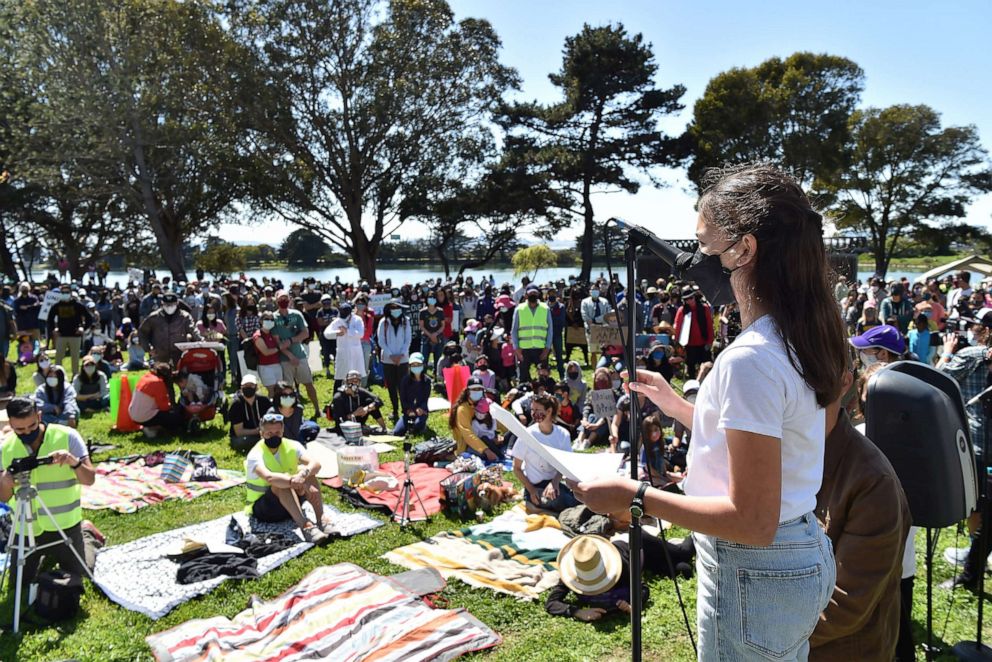A rise in anti-AAPI crimes led these 3 Asian Americans to fight back
Mina Fedor is an American 14-year-old. For her family, disturbing acts of anti-Asian American and Pacific Islander hate have always been a possibility, but it's felt more intense since the pandemic.
In 2020, Mina watched a woman cough at her mother. This act spurred the then-12-year-old to advocacy.
"The lady who did that didn't see a mom. She didn't see a community member. She didn't see an American. She just saw an Asian lady," said Mina.
The middle schooler took action--she decided to host a rally. She didn't expect many people to show, maybe just 50 friends and family from school.
Mina created an online form and saw the numbers tick up ... 75 … 250. The following day around 1,200 people showed up.

That was the birth of AAPI Youth Rising, and Mina's thrust onto the national stage.
Activism in the United States among Asian-Americans is at an all-time high, said Neighbors United Below Canal Founder Jan Lee. He called the mass shootings at Asian themed spas in Atlanta--which killed eight, including six Asian women-- a turning point.
"Atlanta caused us to mourn collectively around that incident," Lee said.
He said it felt like a wake-up call.
Lee was one of 10 arrested while protesting the city's plans to build one of the world's tallest jails within Manhattan's Chinatown; one of four borough-based jails that will eventually be built in New York City to replace Riker's Island.
"We've watched the degradation of what happens to communities when you inundate them with jails and homeless shelters but no new housing," Lee said. "Disinvestment demoralizes people; it causes distrust."

He said that low-income seniors are among the most vulnerable populations in Chinatown, and would be the most affected by the mega-jail's construction.
"The enormity of the project and the long protracted time it will take to complete the structure will have great impact environmentally as well as economically, on Chinatown's future," said Lee.
Lee said his safety is second to a safe place for his elders to live during a rise of AAPI attacks. New York City saw a 262% increase in AAPI hate crimes from 2020 to 2021, according to a Center for the Study of Hate and Extremism report.
The 2020 census data shows that the total Chinatown population is down, including its Chinese population. Lee said the jail is one part of many problems.
"We've seen other communities around us in Manhattan, Lower Manhattan grow, while we get homeless shelters," Lee said.
He said Wall Street is a few blocks away and has no homeless shelters. However, Chinatown has four homeless shelters that the city acknowledges. Lee said there are six in the Chinatown-area within walking distance.
"This administration will always listen to and work with communities to understand their needs while ensuring we can serve our most vulnerable New Yorkers," the New York City mayor's office told ABC News in a statement in response to the number of homeless shelters in Chinatown. "We will always follow the law, and the law says the jails on Rikers Island must close on time. To follow the law and protect the safety of the community, as well as all involved in this project, this work is proceeding. We have engaged deeply with the community every step of the way, and we are committed to continuing to work with them to limit the disruption of this project."
High up in the Utah mountains, Rep. Karen Kwan is also working to bring about awareness - and she's doing so by trying to preserve the past, by teaching the history of Chinese-American workers who were instrumental in building the transcontinental railroad.
"They did the most dangerous jobs, and yet they got the least pay," Kwan said, referring to Chinese-American railroad workers. "They suffered discrimination. They suffered racism, and yet they endured."
Kwan is a historical figure herself as Utah's first Chinese-American lawmaker. The Democrat was elected in 2017 and is now the House Minority Whip.
Kwan said learning the history of Asian Americans in the West is important. For example, she said learning about how Chinese immigrants came to the U.S. to construct railroads during the Civil War under President Abraham Lincoln made her understand the instrumental role many AANHPI's played in building the nation.
"[Learning Chinese-American history] made me realize how long an impact and an integration that we were here," said Kwan. "It made me realize that we have been a part of America for so much longer than I had been taught in school."
Kwan said she does not know many details about the ancestor that brought her family to the U.S. and is believed to have worked on the railroad. But she said she hopes to honor that stranger who provided her with a life in America.
It's been 153 years since the Transcontinental railroad was completed. Kwan has worked with the community to try and get the contributions of Chinese-Americans recognized; she says it was just three years ago that a speaker representing the Chinese-American community spoke during the annual commemorative "Golden Spike" ceremony.
The "Golden Spike" annual ceremony celebrates the completion of the first transcontinental railroad and the literal golden spikes that were embedded in the tracks in 1869, according to the National Park Service.
"I feel both proud and ashamed that it took this long; 150 years after all of the work," said Kwan.
While Kwan and Lee want to restore the past and preserve the present, Mina is looking to change minds for the future.
Mina said that after a school assembly, she decided to start studying what other Asian Americans had done to advocate for their communities and found education was huge.
Mina said she stumbled upon an AAPI history curriculum by pure accident. She said she didn't know why her school didn't include it.
"I was like, oh, jeez. I have never been taught any of this, I don't even know what that is. What's going on?" said Mina.
Now AAPI Youth, Mina's group, is designing a lesson for AAPI month.
She said she's asking schools to teach AAPI history just one day out of the 180 days in an academic year.
"Obviously America's built on immigrants, so why are you calling us foreign?" said Mina. "And if you don't learn about Asian's history in America, then that belief sort of perpetuates itself."
John Palacio contributed to this report.




